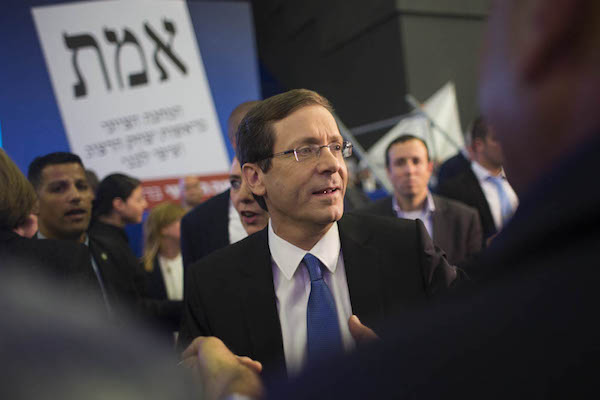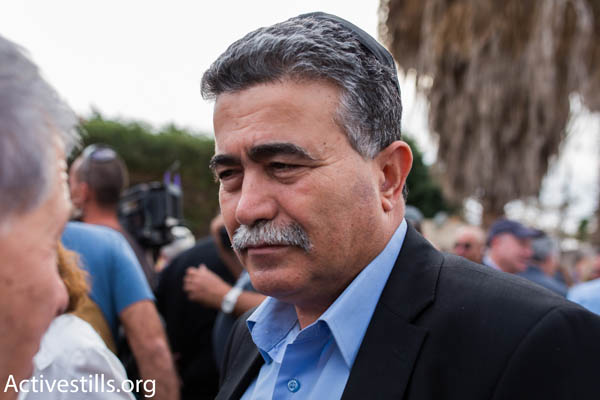The fact that the head of Israel’s opposition could soon join forces with Netanyahu may actually bode well for the Israeli Left and Palestinian citizens alike.

The Israeli media has been beside itself this week with the possibility that the head of the opposition Isaac Herzog, leader of the Labor Party cum Zionist Union, may join Prime Minister Netanyahu’s governing coalition, the executive branch of the Israeli government.
Roughly two weeks of chatterbuzz about Herzog-Netanyahu negotiations have yielded the usual five stages of rumors: from denial (“there are no negotiations”); to low expectations (“they’re just talks, they won’t lead to anything”); to portfolio handout speculation (“it’s a done deal, he’s about to get justice minister and communications”); followed by the classic bait and switch (“we didn’t mean it, looks like Lieberman will join instead”); and then finally acceptance (“Herzog can’t turn back now”), as two radio political commentators decreed this morning.
I am not sure why anyone is surprised. Labor has never shied away from sitting in the rightest of right-wing governments in recent years. I remember how many in the Labor camp were shocked when the party joined Ariel Sharon’s government in 2003. Amir Peretz led the party into Kadima’s government in 2006, taking charge of the Defense Ministry and nearly ruining his political rise. The party then joined Netanyahu’s government in 2009 (among the most extreme in Israel’s history) under Ehud Barak, prompting the loss of one of its more promising members, and eventually splitting the party. Labor/Zionist Union actually has some committed people and fresh faces in its faction, but the party as a body seems to have a mind of its own – one with suicidal inclinations.
The failure of this “can’t beat em so join em” move — every single time it is tried — makes apathy an extremely tempting response. Until I realized that there are several excellent reasons Labor should do it (disclosure: In my day job I am a pollster and political consultant, and I have advised on four national election campaigns for Labor, including in 2015):
Be you. Labor should stop pretending to either its voters, members or legislators to be anything other than what it is — a status-quo preservationist institution. If the party breaks (again) – well, when a waiter drops a glass in a Tel Aviv café it is customary to say “mazal tov!” Now I understand why: perhaps this time a break will prompt a reshuffling of the political center-left. Most of those parties contain with them two camps of voters, centrist and more left leaning (in Israeli terms). The leaders are always angling between the two camps uncomfortably (this is to some extent true in Likud as well, with tension between the center-right and the far-right members of the party). If all the left-leaning members and voters within the center-left parties use the opportunity to form something new, there might eventually be a party that can unify over actual oppositional policies.
Go, Ayman. The opposition is led by the largest party outside the coalition. If Labor joins, the job of opposition leader would go to Joint List head Ayman Odeh. I want this to happen. Why? First, on a personal level, Odeh is one of the rare inspirational and visionary voices in Israeli politics these days.
Second, it is essential that the Palestinian community of Israel, Arab citizens, have a meaningful role in government, and they won’t get into the executive branch anytime soon, just as they haven’t in any genuine way in the past. The role of the opposition is formalized by Israeli law – the leading party must receive regular monthly briefings from the Prime Minister, including on security matters, and receives more Knesset speaking time. It is a position of both insider knowledge and higher public profile than Arab parties ever hold.

Third, the Joint List leading the opposition inside the Knesset is a powerful statement of reward for parties merging. Prior to the merger that created this party, each of the three Arab parties alone was basically powerless.
Fourth, Israel desperately needs to begin viewing Palestinian Arabs in Israel (and anywhere else) as political equals. This role could be a baby-step toward changing attitudes, which will take ages, but which will never happen at all if we don’t start.
And finally, I won’t lie: I will relish watching some people in the current coalition government squirm.
Peace, just around the corner. The latest media frenzy is the “coincidence? I think not!” of Egyptian President Abdel Fatah al-Sisi’s statement on Tuesday, in which he called for Israeli parties to come together in support of a two state peace agreement with the Palestinians, which he hinted could lead to a warmer peace between Israel and Egypt. Israeli commentators are giddy imagining that Herzog is hot to enter the coalition in order to back to such an initiative. Herzog coyly played up this possibility on Tuesday, responding to internal attacks by Labor’s Shelly Yacimovich (among others), saying saying “there are details [about the coalition negotiations] that she doesn’t know.”
The chances that Netanyahu and al-Sisi will conjure up negotiations with some constellation of Palestinian leadership to reach a viable two-state deal in our lifetime look like fifty shades of zero. But what do I know? Trump was supposed to have maxed out in September. If there is even an infinitesimal chance of a diplomatic breakthrough, Netanyahu will darn well need coalition help given the band of self-righteous rejectionists he currently has in there.
So do it, Herzog. I dare you.



